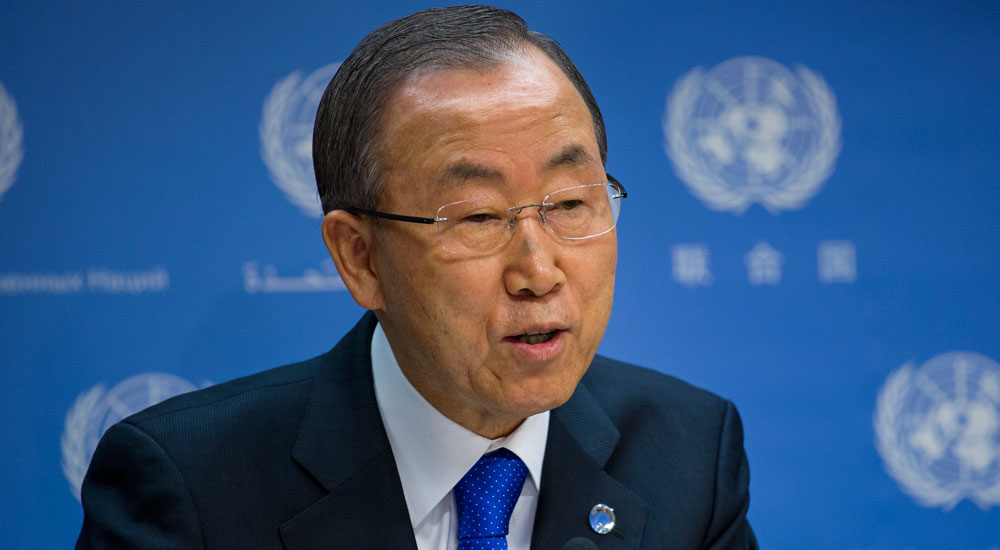
United Nations Secretary-General Ban Ki-moon addresses members of the news media Monday, Sept. 9, 2013, at the United Nations. Ban is urging Syria to immediately agree to transfer chemical weapons and chemical precursors to a safe place within the country for international destruction. AP
UNITED NATIONS—Secretary-General Ban Ki-moon said Friday he believes there will be “an overwhelming report” from UN inspectors that chemical weapons were used in an attack in Syria on August 21, but he did not say who was responsible.
The Syrian government and rebels blame each other for the attack in the Damascus suburb of Ghouta. The Obama administration, which says 1,429 people were killed, has said it has evidence that clearly indicates the Syrian government was behind the attack. But Russia, a key ally of Syria, has said it is not convinced by the US evidence.
The UN inspectors have a mandate to determine whether chemical weapons were used — and if so, which agent — not to establish who was responsible. But two UN diplomats said the report could point to the perpetrators, saying that the inspectors collected many samples from the attack and also interviewed doctors and witnesses.
Ban spoke shortly before the chief chemical weapons inspector, Ake Sellstrom, told The Associated Press that he would deliver his report to the secretary-general in New York this weekend. UN diplomats said Ban was expected to brief the Security Council about it on Monday morning. The spoke anonymously because the time was not yet final.
A senior US intelligence official, meanwhile, said the US reached its own figure for the dead in Ghouta by analyzing videos taken in the hours after the attack and counting the number of people who appeared to have died by chemical attack, including bodies under bloodless shrouds — a sign that they probably did not die by rocket fire or some other conventional means.
US lawmakers were also shown transcripts of the communications intercepts of Syrian officials discussing the attack both before and afterward — including a conversation where one Syrian commander told the military’s chemical weapons unit to cease firing, because they’d done enough damage, according to a congressional official.
The intelligence official said the US is not going to release those transcripts, in part because foreign intelligence agencies provided some of the material.
The Obama administration also said it had established that rockets were fired from a regime-held area into rebel-held areas through satellite imagery, but such imagery has not been shown to lawmakers, though the congressional official said they will ask to see it.
Both officials spoke on condition of anonymity because they were not authorized to discuss how they obtained the intelligence publicly.
At the United Nations, Ban said President Bashar Assad’s regime “has committed many crimes against humanity,” though he did not refer specifically to chemical weapons attacks.
“Therefore, I’m sure that there will be surely the process of accountability when everything is over,” he said.
UN associate spokesman Farhan Haq said that while the report still hasn’t been completed, Ban “has been in touch with different people including the experts.”
The secretary-general spoke at the Women’s International Forum. He thought his speech and his responses to questions that followed were not being broadcast, but they were shown on UN television.
Speaking by telephone from the Netherlands, Sellstrom said he didn’t know exactly when the report would be released publicly. He said that “it’s done, but when to present it is up to the secretary-general.” But in a later conversation Friday, Sellstrom said he wasn’t quite finished with the report, and that what he meant was that it would be done once he delivered it to Ban this weekend.
The two UN diplomats said the inspectors had soil, blood and urine samples and may also have collected remnants of the rockets or other weapons used in the attack, which could point to those responsible. The diplomats spoke on condition of anonymity because discussions on the issue have been confidential.
Haq said after receiving the report, Ban will present it UN member states and that the media should receive it shortly afterward.
In his speech, Ban said “the disaster” in Syria has created “a lost generation of children and young people” and led to “rising sectarian tensions, regional instability, the largest displacements of people in a generation, grave violations of human rights, including sexual violence.”
“The latest fighting has also raised the specter of chemical warfare — which, if confirmed by the UN investigation mission, would be an atrocious violation of international law,” Ban said.